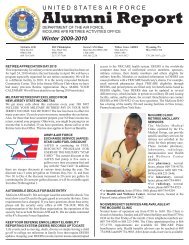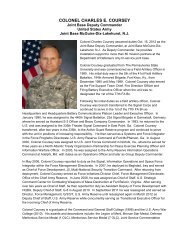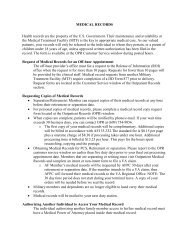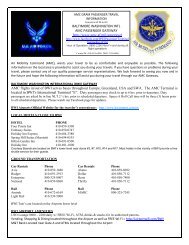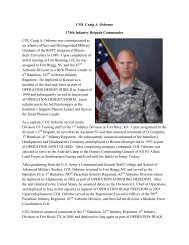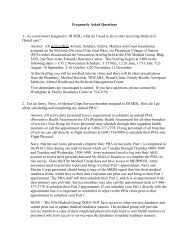305th Medical Group Ambulatory Health Care Center Answers to ...
305th Medical Group Ambulatory Health Care Center Answers to ...
305th Medical Group Ambulatory Health Care Center Answers to ...
You also want an ePaper? Increase the reach of your titles
YUMPU automatically turns print PDFs into web optimized ePapers that Google loves.
All patients obtaining care in this medical/dental treatment facility are entitled <strong>to</strong>certain rights. The foUowing basic rights should be observed by both patients andfacility staff <strong>to</strong> ensure patient care is provided in an appropriate and efficient manner.Respectful Treatment: The patient has the right <strong>to</strong> considerate and respectful care, consisting of thehighest standard of quality within the clinic's capabilities and within applicable laws and regulation.<strong>Medical</strong> <strong>Care</strong> and Dental <strong>Care</strong>: The patient has the right <strong>to</strong> expect timely, high quality of health careconsistent with available resources and generally accepted standards. The patient also has the right<strong>to</strong> care and treatment in a safe environment.Privacy and Confidentiality: The patient has the right, within the law and military regulations, <strong>to</strong>every consideration of privacy and confidentiality concerning medical care.Identify of <strong>Health</strong> <strong>Care</strong> Personnel: The patient has the right <strong>to</strong> know the identity, professional statns,and credentials of health care personnel involved in their care.Participation in <strong>Care</strong>: The patient has the right <strong>to</strong> an explanation concerning their diagnosis, treatmentplan, and prognosis of illness in terms that they can be expected <strong>to</strong> understand. The patienthas the right <strong>to</strong> participate actively in decisions regarding their care. The patient also has the right<strong>to</strong> refuse treatment <strong>to</strong> the extent permitted by law and government regulations, and <strong>to</strong> be informedof the consequences of their refusal.Infonned Consent: The patient has the right <strong>to</strong> be advised in non-clinical terms on informationneeded <strong>to</strong> make knowledgeable decisions on consent or refusal for treatments. Such informationshould include a description of the procedures or treatment, medically significant complications,risks, benefits and alternative treatments available.Pain Management: The patient has the right <strong>to</strong> expect prompt response <strong>to</strong>, evaluation of, and thetreatment of pain.Research Projects: The patient has the right <strong>to</strong> be advised if the facility proposes <strong>to</strong> engage in or performresearch associated with their care or treatment. The patient has the right <strong>to</strong> refuse <strong>to</strong> participatein any research projects.Facility Rules and Regulations: The patient has the right <strong>to</strong> be informed of the facilities rules andregulations that relate <strong>to</strong> patient or visi<strong>to</strong>r conduct and should expect compliance with those rulesfrom other individuals.Patient Complaints: The patient has the right <strong>to</strong> be informed about the facility's mechanism for theinitiation, review and resolution of patient complaints.



